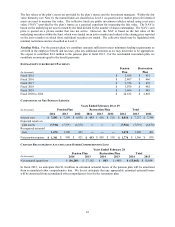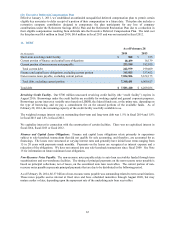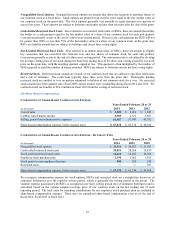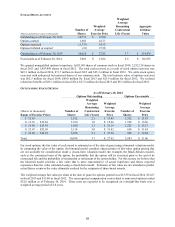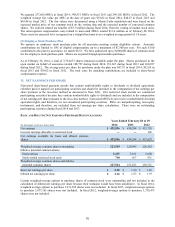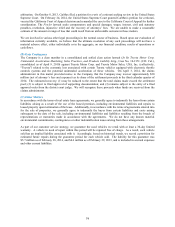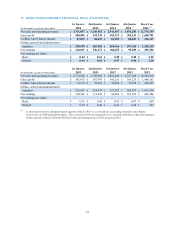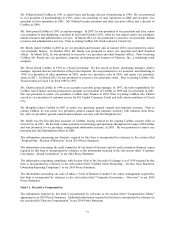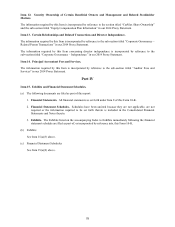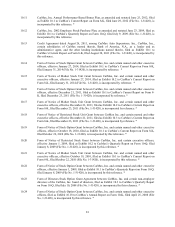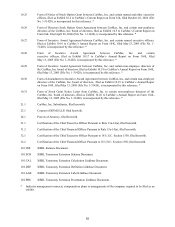CarMax 2014 Annual Report Download - page 77
Download and view the complete annual report
Please find page 77 of the 2014 CarMax annual report below. You can navigate through the pages in the report by either clicking on the pages listed below, or by using the keyword search tool below to find specific information within the annual report.
73
15. LEASE COMMITMENTS
Our leases primarily consist of land or land and building leases related to CarMax superstore locations. Our lease
obligations are based upon contractual minimum rates. Most leases provide that we pay taxes, maintenance,
insurance and operating expenses applicable to the premises. The initial term of most real property leases will
expire within the next 20 years; however, most of the leases have options providing for renewal periods of 5 to 20
years at terms similar to the initial terms. For finance and capital leases, a portion of the periodic lease payments is
recognized as interest expense and the remainder reduces the obligations. For operating leases, rent is recognized on
a straight-line basis over the lease term, including scheduled rent increases and rent holidays. Rent expense for all
operating leases was $43.6 million in fiscal 2014, $42.8 million in fiscal 2013 and $42.3 million in fiscal 2012. See
Note 11 for additional information on finance and capital lease obligations.
FUTURE MINIMUM LEASE OBLIGATIONS
As of February 28, 2014
Capital Finance Operating Lease
(In thousands) Lease (1) Leases (1) Commitments
(1)
Fiscal 2015 $ 304 $ 47,369 $ 42,341
Fiscal 2016 333 48,219 42,400
Fiscal 2017 354 42,589 39,708
Fiscal 2018 354 35,408 36,890
Fiscal 2019 354 32,577 35,639
Fiscal 2020 and thereafter 5,163 160,997 251,091
Total minimum lease payments 6,862 367,159 448,069
Less amounts re
p
resentin
g
interest
(
4,081
)
Present value of net minimum lease payments $ 2,781
(1) Excludes taxes, insurance and other costs payable directly by us. These costs vary from year to year and are incurred in
the ordinary course of business.
16. COMMITMENTS AND CONTINGENCIES
(A) Litigation
On April 2, 2008, Mr. John Fowler filed a putative class action lawsuit against CarMax Auto Superstores California,
LLC and CarMax Auto Superstores West Coast, Inc. in the Superior Court of California, County of Los Angeles.
Subsequently, two other lawsuits, Leena Areso et al. v. CarMax Auto Superstores California, LLC and Justin
Weaver v. CarMax Auto Superstores California, LLC, were consolidated as part of the Fowler case. The allegations
in the consolidated case involved: (1) failure to provide meal and rest breaks or compensation in lieu thereof;
(2) failure to pay wages of terminated or resigned employees related to meal and rest breaks and overtime;
(3) failure to pay overtime; (4) failure to comply with itemized employee wage statement provisions; (5) unfair
competition; and (6) California’s Labor Code Private Attorney General Act. The putative class consisted of sales
consultants, sales managers, and other hourly employees who worked for the company in California from
April 2, 2004, to the present. On May 12, 2009, the court dismissed all of the class claims with respect to the sales
manager putative class. On June 16, 2009, the court dismissed all claims related to the failure to comply with the
itemized employee wage statement provisions. The court also granted CarMax's motion for summary adjudication
with regard to CarMax's alleged failure to pay overtime to the sales consultant putative class. The plaintiffs
appealed the court's ruling regarding the sales consultant overtime claim. On May 20, 2011, the California Court of
Appeal affirmed the ruling in favor of CarMax. The plaintiffs filed a Petition of Review with the California
Supreme Court, which was denied. As a result, the plaintiffs’ overtime claims are no longer a part of the lawsuit.
The claims currently remaining in the lawsuit regarding the sales consultant putative class are: (1) failure to provide
meal and rest breaks or compensation in lieu thereof; (2) failure to pay wages of terminated or resigned employees
related to meal and rest breaks; (3) unfair competition; and (4) California’s Labor Code Private Attorney General
Act. On June 16, 2009, the court entered a stay of these claims pending the outcome of a California Supreme Court
case involving unrelated third parties but related legal issues. Subsequently, CarMax moved to lift the stay and
compel the plaintiffs’ remaining claims into arbitration on an individual basis, which the court granted on
November 21, 2011. The plaintiffs appealed the court’s ruling to the California Court of Appeal. On March 26,
2013, the California Court of Appeal reversed the trial court’s order granting CarMax’s motion to compel


